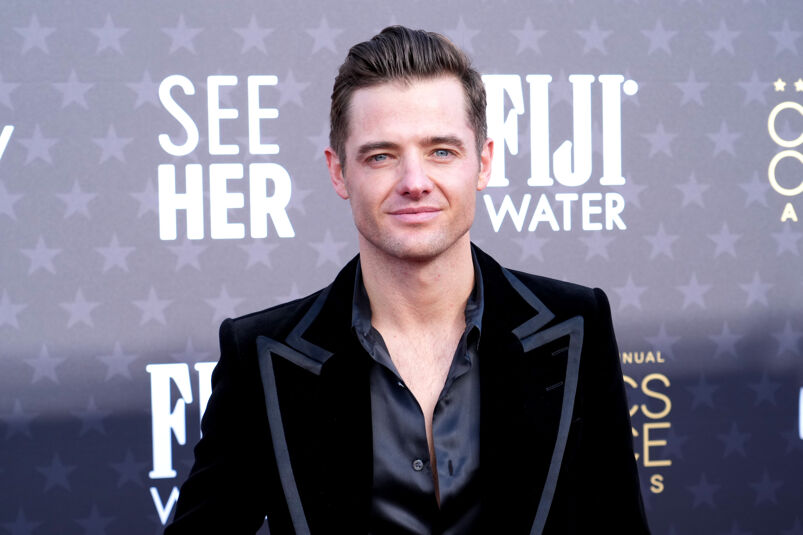
As a closeted gay soccer player, Robbie Rogers was petrified. He thought his career would be over if people found out he was gay, which is why he retired shortly after coming out.
In other words, Rogers knows what it’s like to live in fear of being exposed. Those jarring experiences helped him produce Fellow Travelers, which was recently nominated for a Golden Globe.
“I’ve always felt like an outsider,” Rogers told The Athletic’s Adam Crafton. “In sports, for being a gay man. But I have also felt like an outsider in the gay community because when I came out, I was a gay athlete. Maybe people would look at me and say, ‘You’re not an outsider in the gay community’ but it is how I felt.”
How about we take this to the next level?
Subscribe to our newsletter for a refreshing cocktail (or mocktail) of LGBTQ+ entertainment and pop culture, served up with a side of eye-candy.
Rogers worked on episode five of the award-nominated historical drama, which is about gay romantic secrets and cover ups during the “Lavender Scare” and subsequent decades.
He also worked as a producer on My Policeman, the 2022 drama starring Harry Styles that tells the story of a closeted policeman in the U.K. during the 1950s.
“I would never compare my footballing career to the environment in these productions — I wouldn’t be thrown into jail if I came out,” said Rogers. “But there was jeopardy. It felt like such high stakes.”
Rogers, 36, says his teammates’ outward homophobia fueled his fears. While playing for the British club Leeds United, he says other players reacted viscerally when an image of Justin Fashanu, the only out gay player in Premier League history, appeared on TV (Fashanu committed suicide in 1998).
“All the guys started to say how disgusting it would be for a gay man to be in the showers with us, and saying stupid things such as, ‘If they’re going to shower with us, we should be showering with women.’ One guy turned to me and he’s like, ‘Gosh, I just can’t even think about the physical act of having sex with another man,'” he said.
“And so I’m there, deeply closeted, but at that moment, starting to think about coming out and how that would look and how I would do that. And so I was just like, ‘I have to step away from this world, it’s not healthy for me to try to do this in this world.’”
Rogers retired from soccer when he came out in February 2013.
But Rogers’ story doesn’t end there, of course. Legendary U.S. soccer coach Bruce Arena encouraged Rogers to return to the pitch; and he did, playing for the Los Angeles Galaxy.
Rogers’ new teammate and friend, Landon Donovan, also offered his unabashed support (Donovan is considered one of the game’s all-time greats).
For Rogers, playing as an out gay man was liberating. He won an MLS Championship with the Galaxy in 2014.
“I felt much more courageous when I came back and played for the LA Galaxy because then I was back in the locker room and back on the field,” he said. “Young kids would come up to me and say ‘I’m going back to Tennessee and I’m part of my GSA (Gay-Straight Alliance), what should I be doing in my community?’ So I felt I was really proving to myself: ‘I’m here, I’m changing things in the locker room, I’m competing as Robbie, as a teammate of the Galaxy, but also as a gay man.’ I really found my courage and my voice.”
Today, there are four out gay players in elite men’s pro soccer: Collin Martin, Joshua Cavallo, Jakub Jankto and Jake Daniels, the only out player in the U.K.
There are also numerous allies throughout the game, including Donovan, who coached Martin in 2020, and led his team off the field when an opponent directed an antigay slur at Martin.
Still, there is homophobia in the men’s game. Cavallo in particular isn’t shy about the attacks he’s faced.
He shuts down the homophobes any chance he gets.
One of the big misses for men’s soccer came during the 2022 men’s World Cup, when FIFA capitulated to Qatar and banned players from wearing rainbow armbands, or making any stand for LGBTQ+ rights.
Much to Rogers’ disappointment, the players acquiesced.
“I was really disappointed when the players decided, ‘Oh, we’re going to get a yellow card, so we’re not going to wear these armbands,'” he said. “Imagine if these players would have done that in unison, being like, ‘F*ck you, guys, now we’re going to even make a larger statement because you guys have made this so illegal or forbidden.’ It’s just so ridiculous.”
Now living in Los Angeles with his Hollywood husband Greg Berlanti and two kids, Rogers is blessed with a privileged life.
He takes advantage of every opportunity to be a role model, whether as a soccer player or award-nominated producer.
Rogers says his experience at the Golden Globes was incredible.
“Lenny Kravitz was sitting in front of me and he’s so beautiful and he had this backless tuxedo on. And he’s nearly 60, and I’m like ‘WHAT?’” he said.
Dressed in a stunning white tux, Rogers didn’t look too bad himself.
But that’s not surprising. Rogers impresses everywhere he goes!


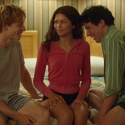


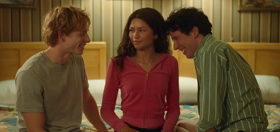

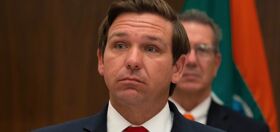

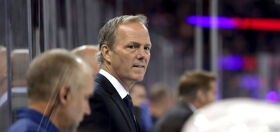
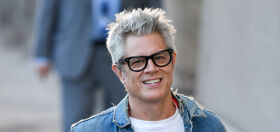
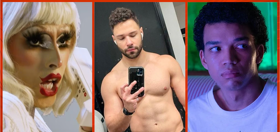
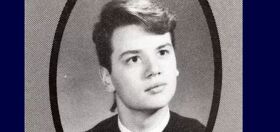


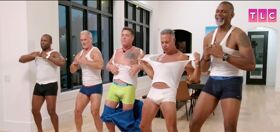

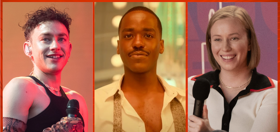
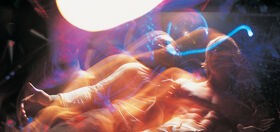
g-sing
the only reason robbie is getting the work he gets is cause he’s married to Greg Berlanti and he has always lived and had a privileged life.